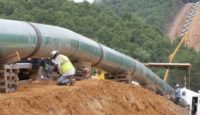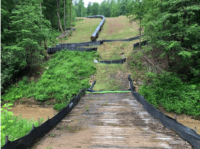Energy Construction
$6.2B Mountain Valley Gas Pipeline Gains Key State Approval

The $6.3 billion Mountain Valley natural gas pipeline crossed a major hurdle to project completion Dec. 14 when Virginia's State Water Control Board approved its water-crossing permit in a 3-2 vote.
The 303-mile, 42-in line from the Marcellus Shale region of northwestern West Virginia runs 107 miles in Virginia and was expanded to include a 70-mile extension into North Carolina. Developers include EQM Midstream, NextEra, ConEdison Transmission and WGL Midstream.
The board, which had a Dec. 31 deadline to decide on the permit, said it approved it after considering all public comments. The project's strongest opponent said no single project in the state in decades presented such a threat to water bodies and residents along its route.
“The board should have acted to prevent further destruction,” said David Sligh, conservation director of advocacy group Wild Virginia, noting that it will continue its seven-year fight against the project.
The line is about 96% complete. "Mountain Valley already has successfully performed multiple crossings of waterbodies and wetlands in Virginia, without adverse impacts to water quality," said a project spokeswoman in a statement.
The pipeline still needs a similar permit from West Virginia and one on the federal level from the U.S. Army Corps of Engineers. The Federal Energy Regulatory Commission also must rule on the developers' request to bore under waterways in West Virginia and Virginia.
The board’s decision should have been guided by the project’s record of violations of water quality requirements, according to Sligh. State environmental records show the project violated water quality rules at least 400 times.
The state's wetlands and stream protection director told the board, however, that the violations were not ongoing and that the permit complies with state laws and regulations, according to local press reports.
The project previously held a Corps Nationwide-12 permit that allowed project-wide water crossings without individual impact review, but that permit was withdrawn last year after a federal court struck down use of blanket permits on energy projects..
Mountain Valley developers instead are pursuing an “individual permit" that incorporates review of hundreds of crossings.
The U.S. Environmental Protection Agency in May asked the Corps to deny the water crossing permit unless modifications and special conditions are incorporated into the project.
In a separate vote earlier this month, Virginia’s Air Pollution Control Board denied a state air permit for a compressor station that was set to be a key part of the pipeline extension into North Carolina, noting conflicts with siting and environmental justice requirements.





